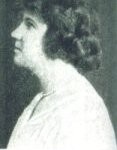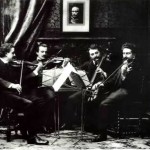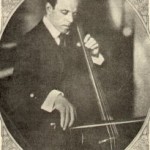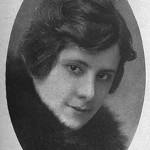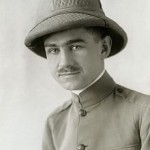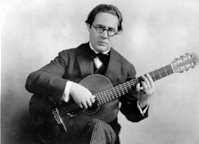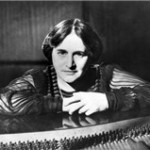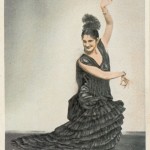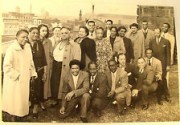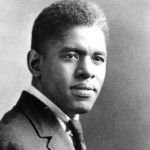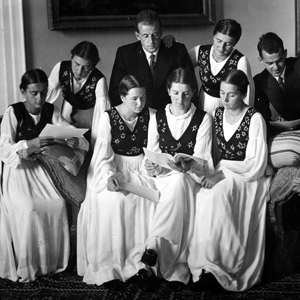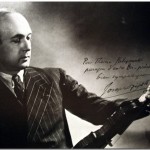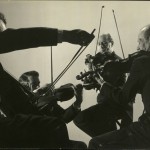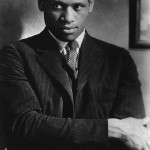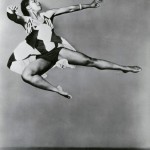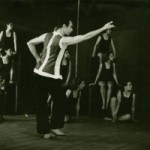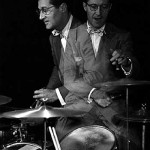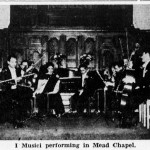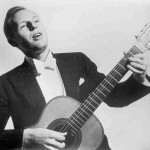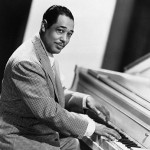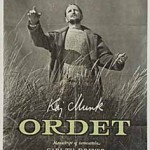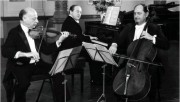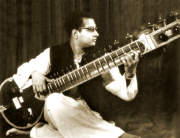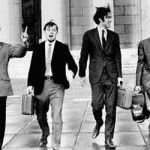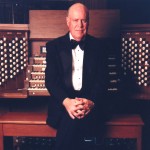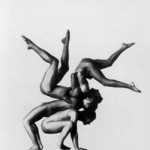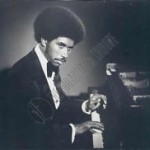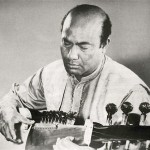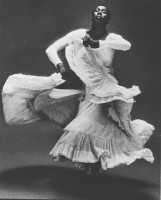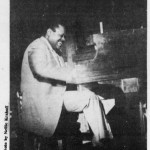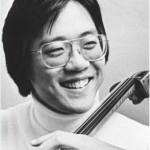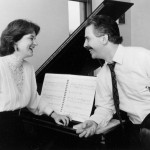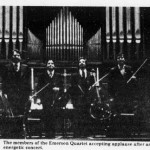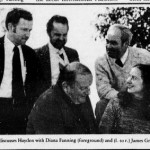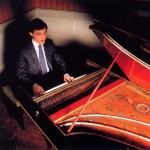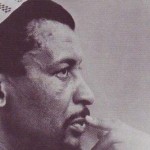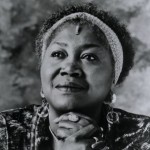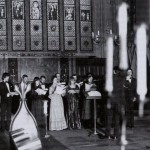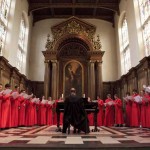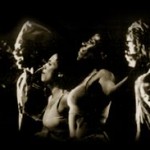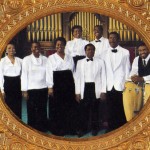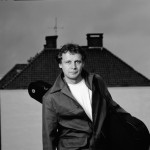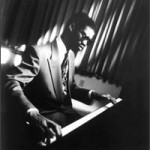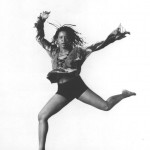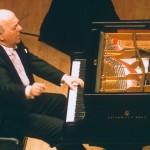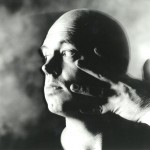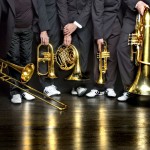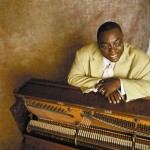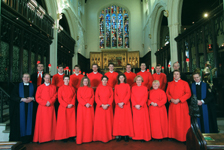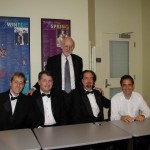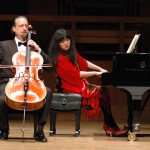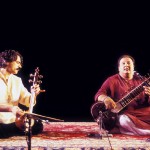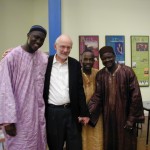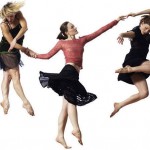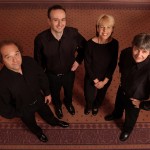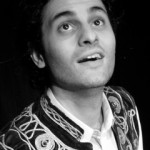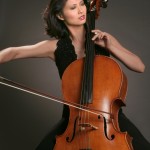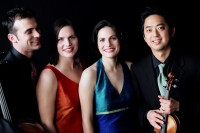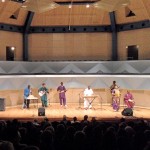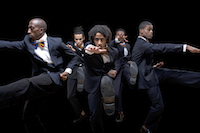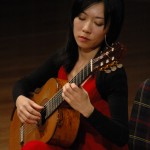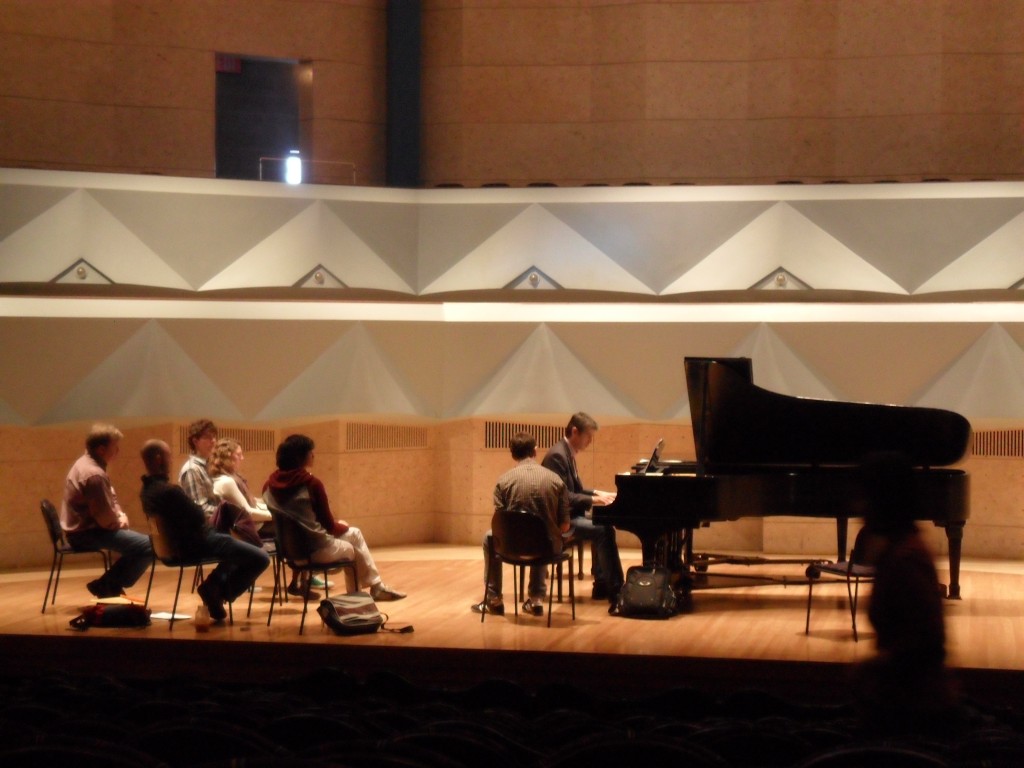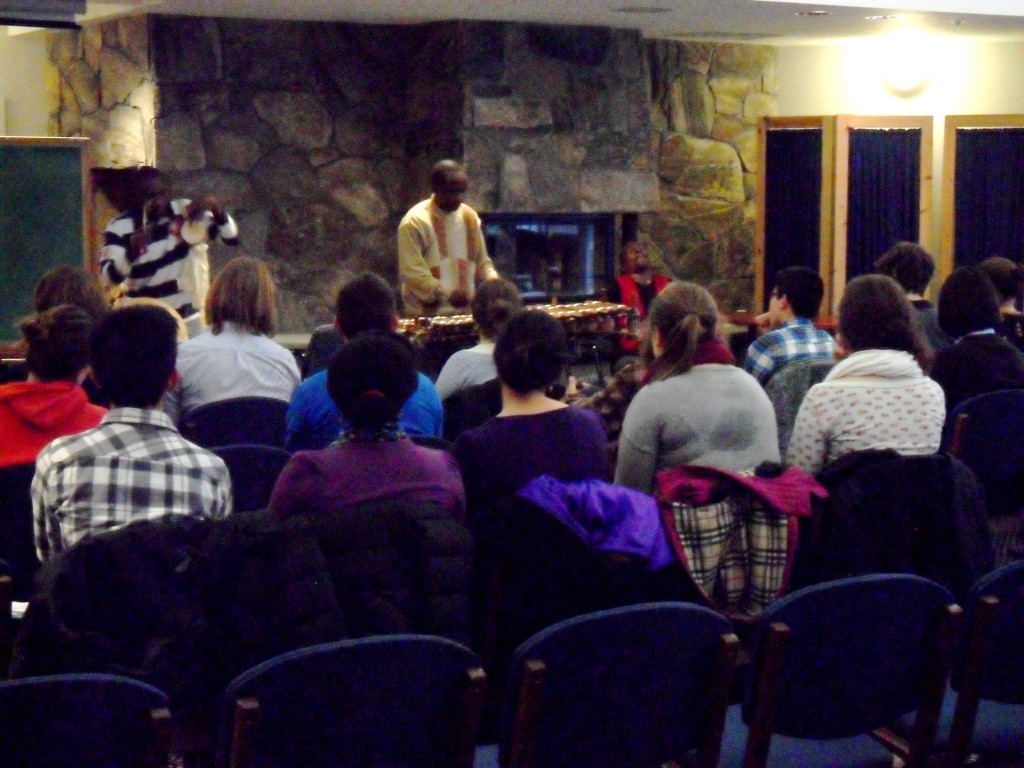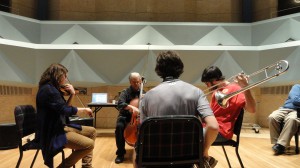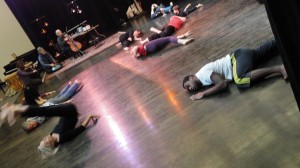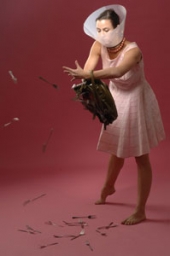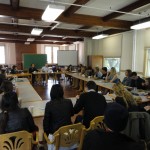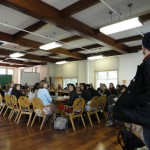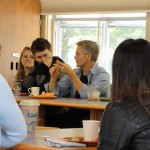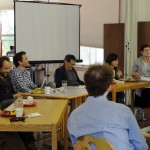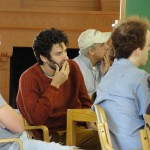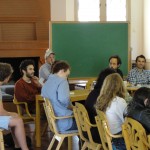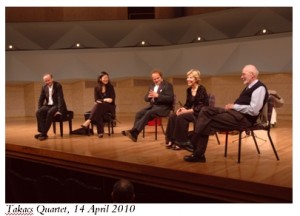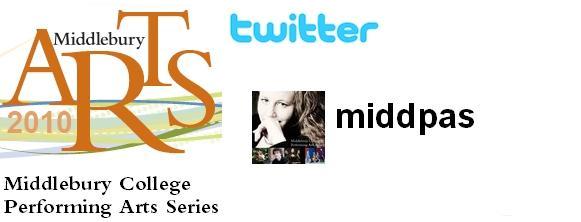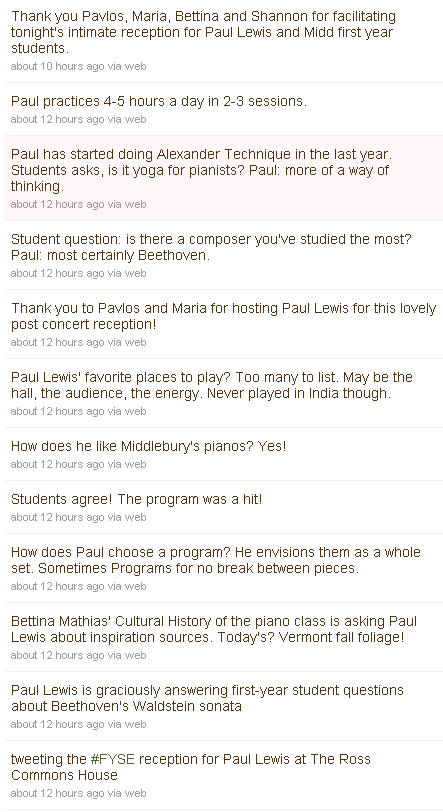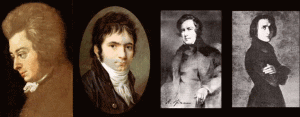 In the 95 years since the creation of the college’s “Entertainment Program” in 1919, we have seen many of the world’s greatest artists perform on the Middlebury campus. Here is a chronological listing of those performances, or you can jump to a specific decade using the links below:
In the 95 years since the creation of the college’s “Entertainment Program” in 1919, we have seen many of the world’s greatest artists perform on the Middlebury campus. Here is a chronological listing of those performances, or you can jump to a specific decade using the links below:
1919-1929 | 1929-1939 | 1939-1949 | 1949-1959 | 1959-1969
1969-1979 | 1979-1989 | 1989-1999 | 1999-2009 | 2009-2014
1919–1920 – Entertainment Program (lecture and entertainment course)
10/08/1919 Thomas Wilfred, performer (dramatic interpretation of ancient songs and ballads)
10/15/1919 Ernest Harold Baynes, illustrated lecture, “The Use of Animals in Modern Warfare”
11/12/1919 William Webster Ellsworth, lecture, “All the Monthly Magazines”
11/19/1919 Joseph C. Lincoln, lecture, “Cape Cod Stories”
12/03/1919 S.K. Ratcliffe, lecture (English journalist)
12/17/1919 Professor William Lyon Phelps, lecture, “The Novel of Today”
01/07/1920 Berkshire String Quartet; Miss Olive Kline, soprano
01/21/1920 Miss Agnes Futterer, drama recital
02/11/1920 John Kendrick Bangs, lecture, “America Abroad” (author and poet)
02/25/1920 Cecil Wright, baritone; E. Harold Gear, organ
03/17/1920 Professor Richard Burton, lecture, “The Drama of Today”
1920–1921 – Entertainment Program
11/01/1920 New York Philharmonic Orchestra
12/01/1920 Guy Maier and Lee Pattison, piano duo
12/15/1920 Stephen Leacock, lecture (noted humorist)
01/11/1921 Reinald Werrenrath, baritone
02/25/1921 Flonzaley Quartet
1921–1922- Entertainment Program
10/31/1921 Honorary William Jennings Bryan, lecture
12/14/1921 Boston Symphony
01/11/1922 Pablo Casals, cello
02/09/1922 Madame Hulda Lashanska, soprano
03/28/1922 J. Stitt Wilson, lecture, “The Master Principle of History”
04/19/1922 New York Chamber Music Society
1922–1923 – Entertainment Program
12/06/1922 Harold Bauer, piano
01/12/1923 Reinald Werrenrath, baritone
03/07/1923 Albert Spalding, violin
1923–1924 – Entertainment Program
09/28/1923 Boston Symphony Orchestra
12/11/1923 Alberto Salvi, harp
02/20/1924 Ignaz Friedman, piano
04/02/1924 Marie Chaperone, soprano (costume recital)
1924–1925 – Entertainment Program
10/29/1924 Felix Fox, piano; Richard Burgin, violin; Jean Bedetti, cello
11/14/1924 Reszki Singers; Mildred Deeling, harpist
12/??/1924 Cecil Arden, soprano
01/23/1925 Guiomar Novaes, piano
??/??/1925 Irving Baceller, lecture (novelist)
1925–1926 – Entertainment and Lecture Program
09/24/1925 Vernon Archibald, Baritone
01/13/1926 William Beebe, Saragasso Sea Explorer, Illustrated lecture
02/02/1926 Walter Brown, author/lecturer: “The Creative Spirit of Youth”
04/15/1926 Norman Angell, author/lecturer: “The Great Illusion”
05/08/1926 Dr. George Pierce Baker, Yale Drama Professor/lecturer: “The Theatre as a Profession”
1926–1927 – Entertainment Program
10/20/1926 Charles Stratton, tenor
11/02/1926 Burton Holmes, lecture (travel)
11/16/1926 Frank Swinerton, lecture, “Authors, Their Friends and Their Critics” ( English novelist, critic)
12/01/1926 Walter Mills, baritone
12/10/1926 Roy Cha an Andrews, motion picture illustrated lecture “Hunting the Bones of Adam”
??/??/1927 Dr. Sigmund Spaeth, music lecture
??/??/1927 Boston Trio; Louise Burt Wood, contralto
1927–1928 – Entertainment Program
10/12/1927 Ethyl Hayden, soprano
10/24/1927 Commander R.E. Byrd, illustrated lecture (transatlantic flight)
11/04/1927 John van Druten, lecture, “The Modern English Drama” (author)
11/14/1927 Jean Gros Marionnettes
12/08/1927 Louis Bromfield, lecture (Pulitizer Prize-winning author)
01/13/1928 Lowell Thomas, motion picture illustrated lecture, “With Lawrence in Arabia”
01/20/1928 Hart House Quartet
03/07/1928 Madame Elly Ney, piano
1928–1929 – Entertainment Program
10/30/1928 Edith Wynne Mathison; Charles Rann Kennedy, “The Chastening” (drama)
11/05/1928 The English Singers
11/13/1928 Tony Sarg Marionnettes
01/14/1929 Andres Segovia, guitar
02/06/1929 Barrere Little Symphony
02/21/1929 Alfred Noyes, lecture (English poet)
03/20/1929 Count van Luckner, lecture (famous German sea devil)
1929–1930 – Entertainment Program
12/04/1929 The Liebeslieder Quartet
01/28/1930 Russian Cossack Chorus
02/28/1930 Thornton Wilder, lecture (author)
03/11/1930 Vilhjalmur Stefansson, lecture (Arctic explorer)
04/11/1930 Myra Hess, pianist (cancelled due to illness)
1930–1931 – Entertainment Program
10/31/1930 Barrere Little Symphony
11/20/1930 Carola Goya, Spanish dance; Beatrice Weller, harp
12/04/1930 Myra Hess, piano
01/13/1931 Cornelia Otis Skinner, entertainer/actress
03/10/1931 Guglielmo Ferrero, lecture (Italian historian and philosopher)
1931-1932 – Entertainment Program
11/06/1931 Kathryn Meisle, contralto
12/03/1931 Ethel Bartlett and Ray Robertson, piano duo
01/13/1932 Ben Greet Players, “Hamlet”
02/19/1932 Helen Howe, actress (original monologues)
03/15/1932 Dr. Arthur C. Pillsbury, lecture, “Miracles of Nature”
1932-1933 – Entertainment Program
11/17/1932 The London Singers
12/03/1932 Professor Will Durant, lecutre (philosophy)
01/12/1933 Carola Goya, Spanish dance
02/23/1933 Dorothy Sands, actress, “Styles of Acting”
03/22/1933 Georges Barrere, flute; Carlos Salzedo, harp; Horace Britt, cello
1933-1934 – Entertainment Program
12/05/1933 Brosa String Quartet
02/07/1934 Toscha Seidel, violin
1934-1935 – Entertainment Program
12/05/1934 Reginald Godden and Scott Malcolm, piano duo
01/11/1935 Jeanne Dusseau, soprano
04/02/1935 Hall-Johnson Negro Choir
1935-1936 – Entertainment Program
10/08/1935? Dr. Everett Dean Martin, lecture, “What is an Educated Person?”
11/01/1935 Doria Fernanda, mezzo-soprano
11/08/1935 Dr. William Beebe, lecture, “Five Hundred Fathoms Down”
02/10/1936 Cremona String Quartet
03/02/1936? Alton Jones, piano
1936-1937 – Entertainment Program
10/15/1936 Blanche Yurka, actress, “The Arc of Theatre”
12/01/1936 Ralph Kirkpatrick, harpsichord
01/27/1937 Barrere Ensemble, wind instruments
02/05/1937? Beaux Arts Singers
03/04/1937 Felix Salmond, cello
05/07/1937 Vermont State Symphony Orchestra
1937-1938 – Entertainment Program
10/02/1937 Stuart Chase, lecture, “Rich Land, Poor Land” (author and economic commentator)
10/27/1937 Orrea Pernet, violin and Bruce Simonds, piano
11/30/1937 The Westminister Choir
12/07/1937 Rollo Walter Brown, author, “Should Intelligent People Read Novels?”
01/07/1938 Curator from Tate Gallery, London, “Pictures are Like People”
01/27/1938 George Barrere Woodwind Ensemble
02/03/1938 Vienna Mozart Boys Choir
03/11/1938 John Mason Brown, drama critic, “Broadway in Review”
1938-1939 – Entertainment Program
11/02/1938 Roland Hayes, tenor
11/03/1938 Roland Hayes, tenor
04/11/1939 Helen McGraw, piano
05/18/1939 John Mason Brown, lecture (dramatic critic from New York Post)
1939-1940 – Entertainment Program
10/11/1939 Vermont State Symphony Orchestra
11/10/1939 The Trapp Family Choir
12/12/1939? Trio of New York: Carl Friedburg, piano; Felix Salmond, cello; Daniel Karpilowsky, violin
04/09/1940 Helen McGraw, piano; Edmund Sherard, violin
04/17/1940 John Mason Brown, lecture (dramatic critic from New York Post)
1940-1941 – Entertainment Program
10/15/1940 Miriam Winslow and Foster FitzSimons, dance
11/12/1940 Dr. Egon Petri, piano
12/10/1940? Eva Le Galliene, actress, “The Value of Theater”
01/14/1941 Dr. Clyde Fisher, lecture, “Exploring the Heavens”
02/26/1941 Vermont Symphony Orchestra
05/14/1941 William Hain, tenor
1941-1942 – Entertainment Program
10/06/1941 Alec Templeton, piano
10/21/1941 Earle Spencer, baritone
12/05/1941 The Siberian Singers
04/22/1942 Vermont Symphony Orchestra
1942-1943 – Entertainment Program
10/21/1942 Joseph Szigeti, violin
11/17/1942 Colonel Edwin Cooper, lecture, “Behind the Lines in Wartime England”
04/02/1943 Jay Allen, lecture (war prisoner); Jose Iturbi, piano
1943-1944 – Entertainment Program
09/05/1943 Robert Weede, baritone
03/24/1944 Whittemore and Lowe, piano duo
04/25/1944 Mia Slavenska, David Tihmar, and Dance Ensemble (Russian dance)
1944-1945 – Entertainment Program
11/03/1944 Anne Brown, soprano
12/07/1944 Eugene Istomin, piano
03/21/1945 Carroll Glenn, violin
04/17/1945 Vermont State Little Symphony Orchestra
1945-1946 – Entertainment Program
11/13/1945 Vermont State Symphony Orchestra
12/04/1945 Budapest String Quartet
01/08/1946 Foxhole Ballet Company
03/26/1946 Helen Jepson, soprano
1946-1947 – Entertainment Program
10/15/1946 Ethel Bartlett and Rae Robertson, piano duo
12/04/1946 Paul Robeson, bass-baritone
01/16/1947 General Platoff; Don Cossack Chorus (Russian chorus)
03/11/1947 Budapest String Quartet
04/22/1947 Vermont State Symphony Orchestra
1947-1948 – Entertainment Program
10/28/1947 Claudio Arrau, piano
12/03/1947 Boris Goldovsky, piano lecture
02/12/1948 Pearl Primus, dance
03/17/1948 Mack Harrell, baritone
??/??/1948 Vermont State Symphony Orchestra
1948-1949 – Entertainment Program
10/21/1948 “MacBeth”
12/08/1948 The Bach Aria Group
02/16/1949 New England Opera Theatre
03/07/1949 Iva Kitchell, satirist
04/27/1949 Vermont Symphony Orchestra; Alan Carter, director
1949-1950 – Entertainment Program
12/08/1949 Richard Dyer-Bennet, folk singer
02/02/1950 Bach Aria Group
03/21/1950 Valerie Bettis, dance
04/24/1950 Vermont Symphony Orchestra; Alan Carter, director; David Smith, piano
1950-1951 – Entertainment Program
10/18/1950 Cornelia Otis Skinner, actress/author
11/16/1950 Miss Margaret Bartels, piano
12/07/1950 Vermont Symphony Orchestra; Alan Carter, director; Maurice Wilk, violin
03/15/1951 Jesús María Sanromá, piano
05/08/1951 Charles Weidman, dance
1951-1952 – Entertainment Program
11/20/1951 Fuzkadi, Basque folk dancers
02/18/1952 Charles Coburn, actor
03/04/1952 Carol Brice, contralto
04/08/1952 Vermont Symphony Orchestra; Alan Carter, director
1952-1953 – Entertainment Program
11/16/1952 David Kinsey, piano
02/20/1953 Ray McKinley, jazz percussion/band leader
03/27/1953 DePaur Infantry Chorus
05/08/1953 Charles Laughton, reading
1953-1954 – Concert Series
10/04/1953 Don Cossack Choir
10/25/1953 Musiqua Antiqua, chamber ensemble
11/11/1953 Ruth Draper, actress
02/07/1954 Columbus Boys Choir
02/19/1954 Vermont Symphony Orchestra; Alan Carter, director
1954-1955 – Concert Series
10/31/1954 Players, Inc., “The Would be Gentleman”
12/09/1954 Quartetto Italiano
01/10/1955 Andres Segovia, guitar
02/18/1955 Ralph Marterie and Band
03/14/1955 Gary Graffman, piano
04/25/1955 Vermont Symphony Orchestra; Alan Carter, director
1955-1956 – Concert Series
10/16/1955 The Canadian Players of Stratford, Ontario
12/04/1955 Gyorgy Sandor, piano
01/15/1956 Olga Coelho, folk singer
02/05/1956 I Musici, chamber ensemble
02/17/1956 Elliot Lawrence and Band
03/05/1956 Middlebury Choir and Orchestra
03/11/1956 Jacob Lawrence, lecture (painter)
04/23/1956 Vermont Symphony Orchestra; Alan Carter, director; Maxim Schur, piano
1956-1957 – Concert Series
10/28/1956 The Canadian Players LTD., “Peer Gynt”
01/14/1957 Quartetto Italiano
02/15/1957 Leroy Holmes with Orchestra
1957-1958 – Concert Series
10/13/1957 Eugene Istomin, piano
11/03/1957 Alfred Deller Trio
12/08/1957 Paganini Quartet
03/02/1958 Richard Dyer-Bennet, folk singer
1958-1959 – Concert Series
10/12/1958 Julien Bream, guitar and lute
11/02/1958 Vienna Octet
11/23/1958 Margaret Webster, actress (Shakespeare readings)
01/11/1959 Walter Carringer, baritone
02/08/1959 Kenneth Amada, piano
05/18/1959 The Middlebury College Chamber Players
1959-1960 – Concert Series
10/11/1959 Orrea Pernel, violin; Karen Tuttle, viola; Lionel Nowak, piano
11/01/1959 The New Art Wind Quartet
01/08/1960 Josh White, folk singer
01/10/1960 Appleton and Field, piano duo
02/07/1960 Heinz Rehfuss, bass-baritone
02/13/1960 Duke Ellington, jazz piano and band leader (Winter Carnival)
03/06/1960 The Julliard Quartet
04/24/1960 Vermont Symphony Orchestra
1960-1961 – Concert and Film Series
10/23/1960 Players, Inc., “The Merchant of Venice”
10/28/1960 FILMS: “Des Ordres” and “Picasso”
12/03/1960 FILM: “The Murderers Among Us”
12/04/1960 Martial Singher, baritone; Lee Luvisi, piano
01/07/1961 FILM: “Million Dollar Legs”
01/15/1961 Paganini String Quartet
02/11/1961 FILM: “Ordet”
02/12/1961 David Bar-Illan, Piano
03/05/1961 New York Chamber Soloists
03/11/1961 FILM: “Miss Julie”
04/15/1961 FILM: “The Proud and the Beautiful”
1961-1962 – Concert and Film Series
09/30/1961 FILMS: “The Land Without Bread” and “Le Retour”
10/15/1961 Alirio Diaz, guitar
10/28/1961 FILM: “The Set Up”
11/04/1961 FILM: “The Day of Wrath”
11/15/1961 Jeaneane Dowis, piano
12/03/1961 Ravi Shankar, sitar
01/13/1962 FILM: “Greed”
01/14/1962 Heinz Rehfus, baritone; Natalie Derujinsky, piano
02/10/1962 FILM: “Maedchen Uniform”
02/18/1962 Hungarian String Quartet
03/17/1962 FILM: “I Vitelloni”
03/18/1962 VSO and Middlebury College Choir, James Cha an, conductor
04/15/1962 Dance Drama Company
04/21/1962 FILM: “Private’s Progress
05/05/1962 FILM: “Ivan the Terrible”
1962-1963 – Concert and Film Series
09/30/1962 Phakavali, Dancers of Thailand
11/04/1962 “Music in Our Time”
12/02/1962 New York Brass Quintet
02/10/1963 Paganini String Quartet
03/10/1963 Beaux Arts Trio
04/21/1963 Vermont Symphony Orchestra
1963-1964 – Concert and Film Series
10/20/1963 Netherlands String Quartet
11/17/1963 VSO, Alan Carter, conductor
12/05/1963 Hungarian String Quartet
01/12/1964 Bela Szilagi, piano
02/18/1964 Dizzy Gillespie and the Grandison Singers
03/08/1964 Juilliard String Quartet
04/12/1964 New York Chamber Soloists
1964-1965 – Middlebury College Celebrity Series
09/26/1964 FILM: “The Goddess”
10/10/1964 FILMS: “Sweet Smell of Success” and “Finishing Touch”
10/18/1964 Festival of the Winds of New York, Melvin Kaplan, director
11/07/1964 FILMS: “Antigone” and “Leave ’em Laughing”
12/05/1964 FILM: “Devi” and “The Music Box”
12/06/1964 Hungarian String Quartet
01/23/1965 FILMS: “Kanal” and “The Perfect Day”
02/11/1965 I Solisti Di Zagreb, Yugoslavian Chamber Orchestra
02/20/1965 FILMS: “The Last Year at Marienbad” and “Sailors Beware”
03/14/1965 Max Pollikoff, violin
03/20/1965 FILMS: “With Love and Kisses” and “Shoot the Piano Player”
04/17/1965 FILMS: “Summerskin” and “Wrong Again”
1965-1966 – Middlebury College Celebrity Series
09/26/1965 Randolph Hokanson, piano
10/31/1965 American Brass Quintet
11/14/1965 Vermont Symphony Orchestra; Alan Carter, director
12/05/1965 Loewenguth Quartet
02/19/1966 FILMS: “The Pharmacist” and “Cleo from 9 to 5”
03/06/1966 Aeolian Chamber Players
03/23/1966 University of Buffalo Chorus
1966-1967 – Middlebury College Celebrity Series
10/16/1966 Smetana Quartet of Prague
11/06/1966 Richard Dyer-Bennet, folk singer
11/12/1966 FILMS: “The Member of the Wedding” and “Rhythm of Africa”
12/03/1966 FILMS: “Joan of Angels” and “Desist Film”
12/04/1966 Vermont Symphony Orchestra; Alan Carter, director
1967-1968 – Middlebury College Celebrity Series
11/05/1967 Nikhil Banerjee, sitar; Kanai Dutta, tabla
02/18/1968 Albert Fuller, harpsichord
04/21/1968 The Boston Symphony Chamber Players
1968-1969 – Middlebury College Concert–Film Series
09/21/1968 FILMS: “Repulsion” and “The Critic” (short subject)
10/04/1968 Betty Jones; Fritz Ludin, lecture/performance “Dances I Dance”
10/12/1968 FILMS: “Big Deal on Madonna Street” and “Perfect Day” (short subject)
10/27/1968 Melos Ensemble of London
11/17/1968 Vermont Symphony Orchestra; Alan Carter, director
11/23/1968 FILMS: “Peter the Great” Parts I and II
??/??/1968 Ashish Khan and Company, from India (Date to be announced, no program)
12/04/1968 Joel Krosnick, cello; Harriet Wingreen, piano
12/07/1968 FILMS: “Victim” and “The Seven Hundred Years”
01/11/1969 FILMS: “The Loves of Jeanne Ney” and “Below Zero”
01/27/1969 New York Chamber Soloists
02/12/1969 Diane Walsh, piano
02/22/1969 FILMS: “The Exterminating Angel” and “Brats”
03/05/1969 Guarneri String Quartet
03/22/1969 FILMS: “The Seventh Seal” and “Men O’War”
1968-1969 – Middlebury College Concert–Film Series
03/26/1969 Frederick Marantz, piano
04/09/1969 Sergiu Luca, violin
04/19/1969 FILMS: “The Pad” and “College”
1969-1970 – Middlebury College Concert–Film Series
09/27/1969 FILMS: “The Ape Woman” and “Bacon Grabbers” (short subject)
10/12/1969 Vermont Symphony Orchestra
10/16/1969 Gerard Souzay, baritone
10/25/1969 FILMS: “M” (Original version) and “The Goat”
11/15/1969 FILMS: “Kanchenjungha” and “Why Do You Smile Mona Lisa?”
12/06/1969 FILM: “Il Successo”
12/07/1969 Charles Castleman, violin
01/11/1970 Eugene Pridonoff, piano
01/17/1970 FILM: “Masculine-Feminine”
02/05/1970 Drolc Quartet
02/24/1970 Cologne Chamber Orchestra
02/28/1970 FILM: “Accatone!”
03/21/1970 FILMS: “Hunger” and “Pack Up Your Troubles”
03/25/1970 Oscar Ghiglia, guitar
04/02/1970 Frances Cole, harpsichord
04/23/1970 Raymond Des Roches, percussion
04/25/1970 FILM: “Beyond the Lab”
1970-1971 – Concert Series
10/11/1970 Vermont Symphony Orchestra
11/11/1970 Charles Rosen, piano
02/01/1971 Beaux Arts Trio
02/24/1971 Don Redlich Dance Company
03/03/1971 Koeckert Quartet
03/10/1971 Anthony Newman, pedal harpsichord and organ
04/25/1971 Francis Fortier, violin
1971-1972 – Concert – Film – Drama Series
09/24/1971 FILM: “Sons of the Desert City”
10/15/1971 FILM: “Storm over Asia”
10/23/1971 The Rod Rodgers Dance Company
11/03/1971 An Evening of New Music
11/10/1971 John Weaver, organ
11/11/1971 DRAMA: Anton Chekov’s The Cherry Orchard
11/12/1971 DRAMA: Anton Chekov’s The Cherry Orchard
11/13/1971 DRAMA: Anton Chekov’s The Cherry Orchard
11/14/1971 DRAMA: Anton Chekov’s The Cherry Orchard
12/03/1971 FILM: “Spies”
01/07/1972 FILM: “In Cold Blood”
01/19/1972 Don Shirley Trio
02/17/1972 Ernst Haefliger, tenor
03/02/1972 DRAMA: Shakespeare’s Hamlet
03/03/1972 DRAMA: Shakespeare’s Hamlet
03/04/1972 DRAMA: Shakespeare’s Hamlet
03/05/1972 DRAMA: Shakespeare’s Hamlet
03/08/1972 Pilobolus Dance Theatre
03/09/1972 Paul Kuentz Chamber Orchestra
03/10/1972 FILM: “Nazarin”
03/22/1972 The Reger Quartet
03/24/1972 FILM: “The White Sheik”
04/14/1972 FILM: “The Sea Gull”
04/16/1972 Kenneth Amada, piano
05/04/1972 DRAMA: Thomas Middleton’s Women, Beware Women
05/05/1972 DRAMA: Thomas Middleton’s Women, Beware Women
05/06/1972 DRAMA: Thomas Middleton’s Women, Beware Women
05/07/1972 DRAMA: Thomas Middleton’s Women, Beware Women
1972-1973 – Concert – Film – Drama Series
10/16/1972 Les Menestriers
10/22/1972 Elly Ameling, soprano; Dalton Baldwin, piano
11/01/1972 Hasklee Thomson, organ
11/12/1972 FILM: “Portrait of Jason”
12/01/1972 DRAMA: August Strindberg’s A Dream Play
12/02/1972 DRAMA: August Strindberg’s A Dream Play
12/03/1972 DRAMA: August Strindberg’s A Dream Play
12/05/1972 Leon Bates, piano
12/07/1972 FILMS: “One A.M.” and “Sherlock, Jr.”
01/18/1973 FILMS: “Work” and “Earth”
01/21/1973 Mario Escudero, guitar
02/14/1973 Saeko Ichinohe and Company (dance)
02/26/1973 Ars Antiqua de Paris
03/08/1973 FILMS: “The Floorwalker” and “Night of the Living Dead”
03/22/1973 FILMS: “The Rink” and “The Milky Way”
1973-1974 – Concert – Drama Series
09/17/1973 Bread and Puppet Theatre
09/18/1973 Bread and Puppet Theatre
11/29/1973 Ali Akbar Khan, sarod
04/10/1974 Music for a While
04/11/1974 Music for a While
1974-1975 – Concert Series
10/07/1974 Alvin Ailey American Dance Theater
10/21/1974 The Esterhazy String Quartet
11/18/1974 Preservation Hall Jazz Band
12/08/1974 The Hartford Ballet
01/07/1975 Claude Kipnis, mime
01/28/1975 Jan De Gaetani, mezzo-soprano
03/17/1975 Dorian Wind Quintet
04/30/1975 Early Music Quartet
1975-1976 – Concert Series
09/14/1975 George Baker, organ
10/06/1975 Waverly Consort
11/17/1975 The Buffalo String Quartet
12/01/1975 Michael Devlin, baritone
01/21/1976 The Beaux Arts Trio
02/22/1976 Soloists of the Ensemble Nipponia
03/13/1976 The Paul Taylor Dance Company
04/25/1976 Vermont Symphony Orchestra
1976-1977 – Concert Series
10/05/1976 Utah Repertory Dance Theater
10/28/1976 Juilliard String Quartet
11/10/1976 Oscar Peterson, piano
11/15/1976 Louis Bagger, harpsichord
01/26/1977 Natalie Hinderas, piano
02/16/1977 Rolf Scharre, mime
03/02/1977 Dorian Wind Quintet
03/15/1977 Barbary Coast
03/28/1977 Margalit Dance Company
04/24/1977 Vermont Symphony Orchestra, Midd. College Choir and Midd. Festival Chorus
1977-1978 – Concert Series
09/18/1977 Vermont Symphony String Quartet
10/05/1977 Contemporary Dance System
10/23/1977 Robert Miller, piano
10/30/1977 Vermont Symphony String Quartet
11/16/1977 Oscar Peterson, piano
01/09/1978 Gerre Hancock, organ
01/11/1978 South Indian Music
02/20/1978 National Theater of the Deaf
03/06/1978 Daniel Nagrin Dance Theater
04/30/1978 Vermont Symphony Orchestra
05/07/1978 Vermont Symphony String Quartet
1978-1979 – Concert Series
10/10/1978 Chuck Davis Dance Company
10/25/1978 Schreuder-Fanning Duo
11/05/1978 Eliot Fisk, classical guitar
12/03/1978 Vincent Corrigan, harpsichord
01/07/1979 Wolfgang Rubsam, organ
01/08/1979 Wolfgang Rubsam, organ
01/19/1979 Clamma Dale, soprano
02/17/1979 Harvard-Radcliffe Collegium Musicum
02/28/1979 Yo Yo Ma, cello
03/13/1979 Joffrey II Dance Company
03/17/1979 Howard University Chorale
03/25/1979 Ruth Geiger, piano
04/11/1979 Pamela Guidetti, flute; Karen Fuller, harp
04/22/1979 Vermont Symphony Orchestra
1979-1980 – Concert Series
09/23/1979 The Aeolian Chamber Players
10/09/1979 American Ballet Theatre
11/04/1979 Robert Noehren, organ
11/14/1979 The Concord String Quartet
01/13/1980 The Aeolian Chamber Players
02/24/1980 Oxana Yablonskaya, piano
03/12/1980 The All-Tap Revue
03/17/1980 University of Wisconsin Choir
03/30/1980 Vermont Symphony Orchestra
04/15/1980 The Empire Brass Quintet
04/23/1980 Norman Fischer, cello; Jeanne Fischer, piano
04/30/1980 Amadeus Trio
05/05/1980 Richard Becker, piano
1980-1981 – Concert Series
09/23/1980 Erick Hawkins Dance Company
10/12/1980 Elysian Trio
10/17/1980 The New Globe Theatre
10/24/1980 Murray Perahia, piano
11/19/1980 The Music Consort
12/05/1980 Composer John Cage and Choreographer Merce Cunningham in Dialogue
12/07/1980 VT Symphony Orch., Midd. College Choir, Community Chorus w/Alumni Soloists
01/11/1981 Ruth Geiger, piano
01/25/1981 Elysian Trio
02/01/1981 Elysian Trio
02/22/1981 Emerson String Quartet
03/11/1981 Meredith Monk Dance Company
03/29/1981 Christof Amtmann, piano
04/26/1981 Calliope: A Renaissance Band
1981-1982 – Concert Series
10/03/1981 H. C. Robbins Landon, lecture, “Mozart and History’s Greatest Lover”
10/03/1981 FILM: Don Giovanni
10/04/1981 FILM: Don Giovanni
10/07/1981 H. C. Robbins Landon, lecture, “How the String Quartet was Born”
10/08/1981 H. C. Robbins Landon, lecture, “The Austrian Crisi”
10/14/1981 H. C. Robbins Landon, lecture, “Haydn:The Quartets of the Eszterhaza Years 1785-90”
10/15/1981 H. C. Robbins Landon, lecture, “Haydn: The Late Quartets”
10/21/1981 H. C. Robbins Landon, lecture, “Mozart’s Late Chamber Music”
10/22/1981 H. C. Robbins Landon, lecture, “Mozart’s First Thoughts”
10/23/1981 Emerson String Quartet
10/24/1981 Emerson String Quartet
11/03/1981 Court Dance, Theater and Music from Okinawa
11/14/1981 New Music Consort
01/16/1982 Rolf Schulte, violin; Andrew Rangell, piano, “All Beethoven I”
01/24/1982 New Music Consort
02/11/1982 The American Repertory Theatre
02/13/1982 The American Repertory Theatre
02/20/1982 Rolf Schulte, violin; Andrew Rangell, piano, “All Beethoven II”
03/06/1982 Rolf Schulte, violin; Andrew Rangell, piano, “All Beethoven III”
03/14/1982 Carlo Curley, organ
03/19/1982 New Music Consort
03/22/1982 University of Wisconsin Concert Choir
03/24/1982 Boehm Woodwind Quintet
04/25/1982 Vermont Symphony Orchestra
1982-1983 – Concert Series
09/24/1982 A Weekend Festival of Mainland Chinese Films
09/25/1982 A Weekend Festival of Mainland Chinese Films
09/26/1982 A Weekend Festival of Mainland Chinese Films
10/02/1982 H. C. Robbins Landon, lecture (Bach)
10/02/1982 New England Bach Festival
10/21/1982 H. C. Robbins Landon, lecture (Beethoven)
10/22/1982 H. C. Robbins Landon, lecture (Beethoven)
10/22/1982 Emerson String Quartet
10/23/1982 H. C. Robbins Landon, lecture (Beethoven)
10/23/1982 Emerson String Quartet
10/24/1982 H. C. Robbins Landon, lecture (Beethoven)
10/24/1982 Emerson String Quartet
10/26/1982 H. C. Robbins Landon, lecture (Beethoven)
10/26/1982 Emerson String Quartet
10/27/1982 H. C. Robbins Landon, lecture (Beethoven)
10 27/1982 Emerson String Quartet
10/28/1982 H. C. Robbins Landon, lecture (Beethoven)
10/28/1982 Emerson String Quartet
11/13/1982 Emerson String Quartet
11/16/1982 Emerson String Quartet
01/10/1983 Timothy Albrecht, organ
02/08/1983 Murray Louis Dance Company
02/14/1983 Boston Camerata
02/21/1983 New York New Music Ensemble
03/06/1983 Christof Amtmann, piano
03/20/1983 The Acting Company
04/16/1983 New Black Eagle Jazz Band
1983-1984 – Concert Series
09/30/1983 Emerson String Quartet
10/01/1983 Emerson String Quartet
10/19/1983 Emerson String Quartet
10/20/1983 Emerson String Quartet
11/13/1983 Emerson String Quartet
11/14/1983 Emerson String Quartet
11/15/1983 Emerson String Quartet
11/16/1983 Emerson String Quartet
02/01/1984 Mummenschanz
02/19/1984 Electric Phoenix
03/04/1984 Ruth Geiger, piano
03/28/1984 Annabelle Gamson, dance
04/28/1984 Vermont Symphony Orchestra
1984-1985 – Concert Series (Paul Nelson, director)
09/21/1984 New England Bach Festival
10/03/1984 Emerson String Quartet
10/05/1984 Emerson String Quartet
10/06/1984 Emerson String Quartet
10/24/1984 Shakespeare and Company
11/16/1984 David Finckel, cello; Wu Han, piano
01/11/1985 FILM: Richard Wagner’s Parsifal
01/25/1985 FILM: Giuseppe Verdi’s La Traviata
03/10/1985 Nina Wiener and Dancers
03/23/1985 Vermont Symphony Orchestra
04/09/1985 Trevor Pinnock, harpsichordist
04/16/1985 Laura Hunter, saxophone; Brian Connelly, piano
04/17/1985 Laura Hunter, saxophone; Brian Connelly, piano
04/27/1985 Nan Nall, soprano; Glenn Parker, piano
1985-1986 – Concert Series
09/21/1985 Al Huang T’ai Chi Master Dancer
09/27/1985 Meliora String Quartet
09/28/1985 Meliora String Quartet
10/04/1985 Meliora String Quartet
10/05/1985 Meliora String Quartet
10/09/1985 San Francisco Mime Troupe
11/02/1985 Salomon String Quartet
11/10/1985 The American Boychoir
11/24/1985 Andrew Rangell, piano
01/19/1986 Mitchell-Ruff Duo
01/21/1986 A Sample of Great Film Scores
01/25/1986 A Sample of Great Film Scores
02/15/1986 Wu Han, piano
03/01/1986 Nancy Spanier Dance Theatre of Colorado
03/15/1986 Jan Opalach, bass-baritone; Irma Vallecillo, piano
04/11/1986 The Hilliard Ensemble
04/20/1986 New York Woodwind Quintet
1986-1987 – Concert Series
09/20/1986 National Marionette Theatre
09/27/1986 Joan Morris, mezzo-soprano; William Bolcom, piano
10/03/1986 Jennifer Muller/The Works – An American Dance Company
10/04/1986 New York Vocal Arts Ensemble
10/17/1986 Zeitgeist
10/29/1986 Gustav Leonhardt, harpsichord
11/07/1986 D’anna Fortunato, mezzo-soprano; David Deveau, piano
11/22/1986 Kenneth and Jean Wentworth, piano duo
01/08/1987 Meliora String Quartet
01/10/1987 Odetta, Folk Singer
01/18/1987 Meliora String Quartet
01/28/1987 Meliora String Quartet
02/17/1987 North Carolina Dance Theatre
02/24/1987 The Boston Viol Consort; Nancy Armstrong, soprano
03/07/1987 Voice of the Turtle (instrumental and vocal ensemble)
03/18/1987 University of Wisconsin Concert Choir
03/21/1987 Vermont Symphony Orchestra
03/25/1987 Cambridge Buskers
04/11/1987 Peter Orth, piano
1987-1988 – Concert Series
09/19/1987 PS 122 Road Show (Cabaret)
09/20/1987 Trinity College Chapel Choir
10/02/1987 National Theatre of the Deaf
10/03/1987 Jean Redpath, folk singer; Abby Newton, cello
10/16/1987 Abdullah Ibrahim, jazz piano
10/30/1987 Western Wind, vocal ensemble
11/11/1987 Hopkinson Smith, lute
11/21/1987 Los Angeles Piano Quartet
01/06/1988 Ridge String Quartet
01/08/1988 Jaime Laredo, violin; Sharon Robinson, cello
01/09/1988 Ridge String Quartet
01/11/1988 Ridge String Quartet
01/15/1988 Odetta, folk singer
01/16/1988 Wendy Perron Dance Company
01/18/1988 Brattleboro Music Center Opera
02/11/1988 Kronos Quartet
02/20/1988 Pearlman/Allen, dance
03/05/1988 Margie Gillis Dance Foundation
03/09/1988 Panayis Lyras, pianist
03/12/1988 Pan Asian Repertory Theatre
03/18/1988 Vermont Symphony Orchestra
04/09/1988 Tallis Scholars (vocal ensemble)
04/27/1988 Andrew Rangell, pianist
1988-1989 – Concert Series
09/30/1988 David Parsons Dance Company
10/01/1988 New Black Eagle Jazz Band
10/14/1988 Elizabeth Swados, composer/musician
10/15/1988 New World String Quartet; David Shifrin, clarinet
10/19/1988 Stars of the D’oyly Carte Opera Company
10/28/1988 The Hilliard Ensemble
11/13/1988 Lydian String Quartet
11/18/1988 Tafelmusik Soloists; Malcolm Bilson, piano
02/02/1989 Mitsuko Shirai, mezzo-soprano; Hartmut Holl, piano
02/10/1989 Anderson-McLellan, guitar duo
02/14/1989 Negro Ensemble Theater
02/19/1989 Quink (Dutch vocal ensemble)
03/05/1989 Marian McPartland Duo
03/10/1989 Arditti String Quartet
03/17/1989 Vermont Symphony Orchestra
04/07/1989 Eugene Friesen, cello; Paul Halley, piano and organ
04/14/1989 Sanford Sylvan, baritone; David Breitman, piano
04/22/1989 Mark Kaplan, violin
04/23/1989 Mark Kaplan, violin
1989-1990 – Concert Series
09/11/1989 Evensong by Trinity College Choir, Cambridge
09/12/1989 Evensong by Trinity College Choir, Cambridge
09/13/1989 Evensong by Trinity College Choir, Cambridge
09/14/1989 Evensong by Trinity College Choir, Cambridge
09/15/1989 Evensong by Trinity College Choir, Cambridge
09/15/1989 Roadside Theatre
09/16/1989 Trinity College Choir, Cambridge
10/13/1989 Jay McShann and Friends, jazz piano
10/14/1989 Anne-Marie McDermott, piano
10/28/1989 Alexander String Quartet
11/11/1989 The Davydov-Fanning Duo
12/03/1989 The Tallis Scholars
01/17/1990 Consort of Musicke Trio
01/25/1990 Wu Han, piano; Pamela Frank, violin; David Finckel, cello
02/16/1990 Aulos Ensemble; Julianne Baird, soprano
02/18/1990 Richard Marlow, organ
03/03/1990 Claudio Jaffe, cello; Elizabeth Sawyer, piano
03/17/1990 Vermont Symphony Orchestra
03/22/1990 Trevor Pinnock, harpsichord
04/01/1990 New York Woodwind Quintet; Orion String Quartet
04/21/1990 Orford String Quartet
1990-1991 – Concert Series
09/14/1990 Paul Winter Consort
09/26/1990 Laredo Dance Theatre
09/29/1990 Dave McKenna, jazz piano
10/05/1990 Jay McShann and Friends
10/27/1990 New England Bach Festival
11/11/1990 Emory Fanning, organ
11/16/1990 Sanford Sylvan and The New Arts Trio
11/30/1990 The Da Capo Chamber Players
01/08/1991 Wu Han, piano; Pamela Frank, violin; Yeesun Kim, cello
01/10/1991 Wu Han, piano; Pamela Frank, violin; Yeesun Kim, cello
01/12/1991 Wu Han, piano; Pamela Frank, violin; Yeesun Kim, cello
01/20/1991 Daniel McKelway and Friends
02/17/1991 Mozart’s Requiem
02/20/1991 A Traveling Jewish Theatre
03/01/1991 Urban Bush Women, dance
03/02/1991 Smithson String Quartet
03/16/1991 Vermont Symphony Orchestra
04/11/1991 The Theatre of Voices
04/12/1991 The Theatre of Voices04/20/1991 Emerson String Quartet; David Shifrin, clarinet
1991-1992 – Concert Series
09/20/1991 Aequalis (chamber music ensemble)
09/21/1991 Glasnost Ballet Tour
09/22/1991 The King’s College Men’s Choir
09/23/1991 Evensong with The King’s College Men’s Choir
10/06/1991 The Lhamo Folk Opera of Tibet
10/12/1991 Dick Hyman, piano
10/26/1991 Harlem Spiritual Ensemble
11/10/1991 New Orchestra of Boston
11/23/1991 The Maggini String Quarte
12/05/1991 Vermont Symphony Orchestra
01/12/1992 Wu Han and Friends
01/13/1992 Shakespeare America – Actors from the London stage
01/14/1992 Shakespeare America – Actors from the London stage
01/15/1992 Shakespeare America – Actors from the London stage
01/16/1992 Shakespeare America – Actors from the London stage
01/17/1992 Shakespeare America – Actors from the London stage
01/18/1992 Shakespeare America – Actors from the London stage
01/19/1992 Wu Han and Friends
02/27/1992 Consort of Musicke
03/07/1992 The Middlebury Festival Chorus and Orchestra
04/04/1992 Sanford Sylvan, baritone
04/12/1992 Dubravka Tomsic, piano
04/24/1992 The Crofut/Brubeck Ensemble
1992-1993 – Concert Series (does not include CFA opening gala events)
09/12/1992 Glen Velez Ensemble
09/24/1992 Blondell Cummings, dance
09/25/1992 Blondell Cummings, dance
09/26/1992 Abdullah Ibrahim, jazz piano
10/06/1992 Artek with Gwendolyn Toth, director
10/23/1992 Tatiana Nikolayeva, piano
10/24/1992 Stoney Lonesome (bluegrass band)
11/07/1992 Peter Wispelwey, cello
11/21/1992 Dmitri Pokrovsky Ensemble
01/16/1993 Harlem Spiritual Ensemble
01/31/1993 Brentano String Quartet
02/07/1993 Ysaye Quartet
02/12/1993 El Teatro Campesino (Latin American theater)
02/14/1993 Menahem Pressler, piano
02/20/1993 Leontovych String Quartet
03/05/1993 Vermont Symphony Orchestra
04/04/1993 Orion String Quartet
04/17/1993 Ali Akbar Khan, sarod
1993-1994 – Concert Series
10/20/1993 Marcus Roberts, jazz piano
10/03/1993 Rumillajta, Music of the Andea
10/14/1993 John Wustman, Schubert Liederabend
10/16/1993 Ruggieri Chamber Soloists
10/17/1993 Ed Trickett, Gordon Bok, and Ann Muir (folk singers)
10/30/1993 Pinkas and Hirsch, piano duo
11/14/1993 Christopher Trakas, baritone; Glenn Parker, piano
12/05/1993 The Sixteen
01/09/1994 David Finckel, cello; Wu Han, pianist
01/22/1994 Mosaic
01/30/1994 St. Lawrence String Quartet
02/18/1994 Jomandi Productions (drama)
02/27/1994 The Borromeo Quartet
03/04/1994 Vermont Symphony Orchestra
03/05/1994 Creach/Koester, dance
03/06/1994 Creach/Koester, dance
03/11/1994 Evelyn Glennie, percussion
03/13/1994 Harlem Spiritual Ensemble
04/14/1994 Takács Quartet; Christof Amtmann, piano
04/22/1994 Auryn Quartet
04/30/1994 Pamela Frank, violin; Claude Frank, piano
05/08/1994 Middlebury Colleg Chorus and Orchestra
1994-1995 – Concert Series
09/12/1994 Collegium Regale of the King’s College Choir, Cambridge
09/28/1994 The Chamber Music Society of Lincoln Center
10/02/1994 Torlief Thedeen, cello; Stefan Bojsten, piano
10/07/1994 Walk and Squawk Productions (drama)
10/08/1994 Mitchell-Ruff Duo, jazz
10/22/1994 Meridian Arts Ensemble
10/23/1994 Musicians from Marlboro
11/02/1994 Bebe Miller Company
11/05/1994 Lee Luvisi, piano
12/03/1994 The Klezmatics
12/16/1994 Boston Camerata
01/08/1995 Diaz Trio
01/14/1995 Acappellafellas
01/20/1995 Orlando String Quartet
01/28/1995 Harlem Spiritual Ensemble
02/17/1995 Ladysmith Black Mambazo
02/26/1995 Tricia Park, violin
03/10/1995 The Locke Consort
03/11/1995 Art Bridgman/Myrna Parker: “The Bare-Bones Circus”
03/19/1995 Balanescu Quartet
04/09/1995 Tokyo String Quartet
04/21/1995 Charlotte Blake Alston, storytelling
04/30/1995 Brentano String Quartet
1995-1996 Concert Series
09/23/1995 Kevin Locke
09/25/1995 Trinmen
09/29/1995 Mark O’Connor, Folk Fiddler
09/30/1995 Doug Varone and Dancers
10/05/1995 The Takács Quartet
10/07/1995 The Takács Quartet
10/15/1995 The Raphael Ensemble
10/28/1995 Gene Bertoncini Trio
10/29/1995 Terezin Project: Hans Krasa’s “Brundibar” and Viktor Ullman’s “The Emperor of Atlantis”
11/08/1995 Shahid Parvaez Khan, sitar
12/16/1995 St. John’s College Choir
12/17/1995 St. John’s College Choir, Evensong
01/23/1996 Palladian Ensemble
01/28/1996 Miami String Quartet
02/16/1996 Ivan Moravec, piano
02/21/1996 Transylvan String Quartet
02/29/1996 Benita Valente, Soprano; Mitsuko Shirai, Mezzo; Hartmut Höll, piano
03/09/1996 Rinde Eckert, The Idiot Variations
03/12/1996 Dubravka Tomsic, Piano
03/21/1996 Chamber Music Society of Lincoln Center, David Shifrin, Artistic Dir.
04/05/1996 Shivkumar Sharma, santoor
04/13/1996 Weslia Whitfield, cabaret
04/20/1996 Meridian Arts Ensemble
1996-1997 Concert Series
09/28/1996 Chamber Music Society of Lincoln Center
10/02/1996 Russell Braun, baritone (Marilyn Horne Artist)
10/04/1996 Diavolo Dance Theatre
10/05/1996 Diavolo Dance Theatre
10/12/1996 St. Paul’s Knightsbridge Choir
10/26/1996 Nathaniel E. Kachadorian Memorial Jazz Concert
10/30/1996 Vishwa Mohan Bhatt & Sukhvinder Singh Namadhari
12/15/1996 Aulos Ensemble
01/15/1997 Kalichstein-Laredo-Robinson Piano Trio
01/22/1997 The Caribbean Dance Co. of the Virgin Islands
01/25/1997 Charles Rosen, piano
02/14/1997 Black Voices
02/15/1997 Black Voices
02/19/1997 Emerson String Quartet
03/15/1997 Pamela Frank, violin; Claude Frank, piano
03/21/1997 Tommy Flanagan Trio
04/16/1997 Takács Quartet
04/18/1997 Takács Quartet
1997-1998 Concert Series
09/18/1997 Kalichstein-Laredo-Robinson Piano Trio
09/26/1997 Margaret Lattimore, mezzo-soprano (Marilyn Horne Artist)
10/03/1997 Eiko & Kima: River
10/04/1997 Eiko & Kima: River
10/14/1997 Peter Serkin, piano
11/08/1997 “Shakespeare’s Kings: The Exercise of Power” by Oliver Ford Davies, actor
11/15/1997 Orlando Consort
11/23/1997 Emanuel Ax, piano
01/11/1998 David Finckel, cello; Wu Han, Piano
01/22/1998 Aurora Nova
02/14/1998 Cyrus Chesnut Trio
03/10/1998 Tokyo String Quartet
03/13/1998 Ian Bostridge
04/07/1998 Kalichstein-Laredo-Robinson Piano Trio
04/19/1998 Angeles String Quartet
04/25/1998 Maestro Ali Akbar Khan, sarod
1998-1999 Concert Series
09/18/1998 Potomac Theatre Project: Good
09/19/1998 Potomac Theatre Project: Good
09/23/1998 Leila Josefowicz, violin; John Novacek, piano
09/28/1998 Bebe Miller Company
09/29/1998 Bebe Miller Company
10/07/1998 Takács Quartet: Bravo Beethoven!
10/09/1998 Takács Quartet: Bravo Beethoven!
11/04/1998 Ewa Podles, contralto; Jerzy Marchwinski, piano
11/11/1998 Ghazal Ensemble
11/15/1998 Romanesca
01/21/1999 Takács Quartet: Bravo Beethoven!
01/23/1999 Takács Quartet: Bravo Beethoven!
01/28/1999 I Fagiolini
02/12/1999 Mary Phillips, mezzo-soprano (Marilyn Horne Artist)
03/05/1999 Canadian Brass
03/13/1999 Cyrus Chestnut Trio
04/08/1999 Takács Quartet: Bravo Beethoven!
04/10/1999 Takács Quartet: Bravo Beethoven!
04/26/1999 Quatour Mosaiques
1999-2000 Concert Series
10/06/1999 Mehr & Sher Ali
10/13/1999 Mark O’Connor
10/19/1999 Weston Playhouse
10/30/1999 Emmanuel Pahud, flute
11/13/1999 Music from China
11/17/1999 Clerks’ Group
01/15/2000 Vermeer Quartet
01/21/2000 Ivan Moravec, piano
02/04/2000 Horacio Gutierrez, piano
02/11/2000 Sari Gruber, soprano (Marilyn Horne Artist)
02/19/2000 Wu Han Trio
03/02/2000 Sanford Sylvan, baritone
04/05/2000 Steve Reich & Musicians
04/16/2000 Garrick Ohlsson, piano
2000-2001 Concert Series
09/23/2000 Cyrus Chestnut Trio
10/06/2000 Emerson String Quartet
10/08/2000 Emerson String Quartet extra
10/21/2000 Raphael Trio with Desiree Halac, mezzo-soprano
10/27/2000 Theatre of Voices
10/28/2000 Pilobolus Too
10/29/2000 Pilobolus Too
11/11/2000 Lilya Zilberstein, piano
01/19/2001 Arnaldo Cohen
01/24/2001 Takács Quartet
01/27/2001 Takács Quartet
02/17/2001 Scott Hendricks, baritone (Marilyn Horne Artist)
03/02/2001 Trio Fontenay
03/06/2001 Huelgas Ensemble (cancelled due to blizzard)
03/11/2001 Musicians from Marlboro
04/03/2001 Gertrude & Alice by the Foundry Theatre
04/04/2001 Gertrude & Alice by the Foundry Theatre
04/17/2001 Stephen Kovacevich, piano
04/19/2001 St. Margaret’s Choir, Westminster Abbey – Evensong
04/20/2001 St. Margaret’s Choir, Westminster Abbey – Paul Nelson Tribute
2001-2002 – Performing Arts Series
09/28/2001 Cyrus Chestnut Trio
10/02/2001 Takács Quartet Preview: Janacek’s String Quartets, with Stephen Donadio
10/04/2001 Takács Quartet
10/05/2001 Chavasse Dance & Performance
10/06/2001 Chavasse Dance & Performance
10/12/2001 London Theatre Exchange: “Elizabeth Rivals: Art or Money”
10/13/2001 London Theatre Exchange: “A Century on Stage: from Shaw & Wilde to the Present”
11/18/2001 Ivan Moravec, piano
01/25/2002 Takács Quartet
01/31/2002 Andrew Manze, violin; Richard Egarr, harpsichord
02/13/2002 Kandia Kouyate: The Soul of Mali
02/15/2002 Claude Frank, piano
03/07/2002 FILM: “Summer in Ivye” by Tamar Rogoff
03/08/2002 “Daughter of a Pacifist Soldier” by Tamar Rogoff
03/09/2002 “Daughter of a Pacifist Soldier” by Tamar Rogoff
03/17/2002 David Daniels, countertenor
04/05/2002 Tokyo String Quartet
04/19/2002 Wu Han, piano
04/04/2002 Gidon Kremer, violin
2002-2003 – Performing Arts Series
09/27/2002 Rinde Eckert, “An Idiot Divine”
10/12/2002 Emerson String Quartet
10/13/2002 Emerson String Quartet
11/08/2002 Brentano String Quartet “Bach Perspectives: Ten Composers React to the Art Of Fugue” (Middlebury Co-Commissioner)
11/15/2002 David Dorfman Dance
11/16/2002 David Dorfman Dance
11/17/2002 Thomas Trotter, organ
12/06/2002 Gerald Finley, baritone And Julius Drake, piano
01/25/2003 Takács Quartet (Premiere of Life in Wayang, by Middlebury faculty Su Lian Tan)
02/14/2003 Anne Bogart (Lecture)
03/07/2003 Paul Lewis, piano
03/14/2003 Piotr Anderszewski, piano
03/18/2003 Belcea Quartet (cancelled)
04/04/2003 Steven Isserlis, cello; Pascal Devoyon, piano
04/25/2003 Arnaldo Cohen, piano
2003-2004 – Performing Arts Series
09/19/2003 Wu Han, piano; David Finckel, cello
10/03/2003 Brenda Dixon Gottschild and Hellmut Gottschild: Tongue Smell Color
10/04/2003 Mamadou Diabate, kora player and ensemble
10/24/2003 La Venexiana
10/26/2003 Ghazal
11/06/2003 I Fagiolini
11/09/2003 Julia Fischer, violin; Robert Kulek, Piano
11/23/2003 Muir String Quartet (courtesy of the Institute for Clinical Science and Art; Dr. F. William Sunderman, director)
01/16/2004 Belcea Quartet
01/17/2004 capsize by sprung
02/13/2004 Ivan Moravec
03/11/2004 Ronald K. Brown/ EVIDENCE (dance)
03/12/2004 Ronald K. Brown/ EVIDENCE
03/13/2004 Florestan Trio
04/16/2004 Takács Quartet
04/27/2004 Krystian Zimerman, piano
05/02/2004 Gidon Kremer/Kremerata Musica
2004-2005 – Performing Arts Series
09/17/2004 An American Revolution, By Jay Parini, Performed by Oldcastle Theatre Company
09/18/2004 Emerson String Quartet (courtesy of the Institute for Clinical Science and Art; Dr. F. William Sunderman, director)
09/24/2004 Mamadou Diabate, kora and ensemble
10/02/2004 Concertante
10/04-10/12/2004 Project Bandaloop in Residence: Celebrating the New Middlebury College Library and Inauguration of President Ron D. Liebowitz
10/22/2004 Cyrus Chestnut Trio
11/13/2004 Pieter Wispelwey, cello; Dejan Lazić, piano
12/10/2004 Henning Kraggerud, violin; Helge Kjekshus, piano
01/11/2005 Richard Goode, piano
02/11/2005 Vienna Piano Trio
02/18/2005 Paul Lewis, piano
03/11/2005 Steven Osborne, piano
04/08/2005 Takács Quartet
04/23/2005 Artemis Quartet
04/26/2005 The Hilliard Ensemble
2005-2006 – Performing Arts Series
09/24/2005 Kirill Troussov, violin, Alexandra Troussova, piano
09/26/2005 “Hip-Hop Theatre: The Lecture”, with Will Power
09/27/2005 Flow, written and performed by Will Power
10/06/2005 Rajeev Taranath, sarod
10/14/2005 Pierre-Laurent Aimard, piano
10/28/2005 Paul Lewis, piano
10/30/2005 Fischer-Ishizaka-Chernyavska Trio
11/03/2005 Dance Lecture/Demonstration with Bill Young
11/04/2005 Bill Young and Dancers
11/05/2005 Bill Young and Dancers
11/06/2005 Muir String Quartet (courtesy of the Institute for Clinical Science and Art; Dr. F. William Sunderman, director)
01/27/2006 Dejan Lazic, piano
02/21/2006 David Finckel, cello; Wu Han, piano
03/03/2006 Mihaela Ursuleasa, piano
03/12/2006 Belcea Quartet
03/16/2006 Paul Lewis, piano
04/02/2006 Tallis Scholars
04/08/2006 Takács Quartet
05/12/2006 Paul Lewis, piano
2006-2007 – Performing Arts Series
09/15/2006 Tokyo String Quartet (courtesy of the Institute for Clinical Science and Art; Dr. F. WilliamSunderman, director)
09/25/2006 SITI Company:A Midsummer Night’s Dream
10/03/2006 Bebe Miller Dance Company
10/03/2006 Bebe Miller Dance Company
10/13/2006 Paul Lewis, piano
10/20/2006 Florestan Trio
10/25/2006 Krystian Zimerman, piano
11/17/2006 Pei Yao Wang, piano and Friends
12/03/2006 Paul Jacobs, organ
01/19/2007 Christianne Stotijn, mezzo-soprano; Joseph Breinl, piano
01/26/2007 Paul Lewis, piano
02/16/2007 Pieter Wispelwey, cello; Dejan Lazic, piano
03/09/2007 Paul Lewis, piano
03/18/2007 Ingrid Fliter, piano
04/08/2007 Julia Fischer, violin; Milana Chernyavska, piano
04/13/2007 Takács Quartet
05/02/2007 Lise de la Salle, piano
05/11/2007 Paul Lewis, piano
2007-2008 – Performing Arts Series
09/15/2007 Cyrus Chestnut Trio
10/08/2007 Rinde Eckert: Horizon
10/13/2007 Christian Gerhaher, baritone; Gerold Huber, piano
10/26/2007 Polina Leschenko, piano
11/01/2007 Alpha Yaya Diallo and the Bafing Riders
11/02/2007 Emerson String Quartet (courtesy of the Institute for Clinical Science and Art; Dr. F. William Sunderman, director)
11/09/2007 Nugent+Matteson Dance
11/10/2007 Nugent+Matteson Dance
11/16/2007 Claremont Trio
12/02/2007 Paul Jacobs, organ
01/11/2008 Takács Quartet
02/14/2008 Xuefei Yang, guitar
03/01/2008 Tallis Scholars; Peter Phillips, director
03/07/2008 Albers Trio; Pei Yao Wang, piano
03/08/2008 Dance Elixir; Leyya Mona Tawil, director
03/09/2008 Dance Elixir; Leyya Mona Tawil, director
03/14/2008 Florestan Trio
04/01/2008 Kate Royal, soprano; Roger Vignoles, piano
04/19/2008 Pavel Haas String Quartet
04/23/2008 Dubravka Tomsic, piano
05/02/2008 Paul Lewis, piano
2008-2009 – Performing Arts Series
09/19/2008 Vladimir Feltsman, piano
09/28/2008 Takács Quartet (courtesy of the Institute for Clinical Science and Art; Dr. F. William Sunderman, director)
10/05/2008 Ken Cowan, organ
10/06/2008 The Kite Runner
10/07/2008 The Kite Runner
10/17/2008 Kartik Seshadri, sitar; Arup Chattopadhyay, tabla
10/24/2008 Lisa Gonzales ’94 and Darrell Jones Dance
10/25/2008 Lisa Gonzales ’94 and Darrell Jones Dance
11/02/2008 Keller Quartett
11/07/2008 Pieter Wispelwey, cello; Alexander Melnikov, piano
11/14/2008 Cedric Tiberghien, piano
01/10/2009 Sophie Shao & Friends
01/16/2009 Bernarda Fink, mezzo-soprano ; Anthony Spiri, piano
02/14/2009 Christianne Stotijn, mezzo-soprano; Joseph Breinl, piano
03/06/2009 Ronald K. Brown/EVIDENCE Dance One Shot
03/07/2009 Ronald K. Brown/EVIDENCE Dance One Shot
03/13/2009 Arabella Steinbacher, violin; Robert Kulek, piano
03/19/2009 Johannes Quartet with Theodore Nelson, cello
04/19/2009 Ivan Moravec, piano
05/08/2009 Paul Lewis, piano
2009-2010 – Performing Arts Series
09/18/2009 Aaron Diehl Trio
09/22/2009 Classical Theatre of Harlem: Waiting for Godot
09/23/2009 Classical Theatre of Harlem: Waiting for Godot
10/02/2009 Emerson String Quartet (courtesy of the Institute for Clinical Science and Art)
10/16/2009 Inspirit Dance
10/17/2009 Inspirit Dance
11/06/2009 Pavel Haas Quartet
11/12/2009 Alina Ibragimova, violin
01/15/2010 Rustem Hayroudinoff, piano
02/13/2010 Sophie Shao & Friends
02/27/2010 Philip Hamilton, voice
03/05/2010 Jean-Guihen Queyras, cello; Alexandre Tharaud, piano
03/11/2010 Guillermo Gómez-Peña
03/12/2010 Hugo Wolf Quartett
04/04/2010 Richard Goode, piano
04/14/2010 Takács Quartet
04/23/2010 Hong, Xu, piano
2010-2011 – Performing Arts Series
10/09/2010 Till Fellner, piano
10/12/2010 Paul Lewis, piano
10/29/2010 Sophie Shao and Friends
10/29/2010 Tamar Rogoff Performance Projects: Diagnosis of a Faun
10/29/2010 Tamar Rogoff Performance Projects: Diagnosis of a Faun
11/11/2010 Jupiter String Quartet
11/12/2010 Diana Fanning, piano; Jupiter String Quartet; Dieuwke Davydov, cello
(courtesy of the Institute for Clinical Science and Art) (1,000th series performance!)
11/30/2010 Christianne Stotijn, mezzo-sop.; Joseph Breinl, piano
01/21/2011 Nareh Arghamanyan, piano
02/15/2011 Paul Lewis, piano
02/27/2011 Nathan Laube, organ
03/04/2011 Sophie Shao and Friends
03/12/2011 Abbey Theatre, Dublin: Terminus
03/18/2011 Big Action Performance Ensemble: Everyone Can Dance
03/19/2011 Big Action Performance Ensemble: Everyone Can Dance
03/24/2011 Belcea Quartet
04/13/2011 Dubravka Tomsic, piano
05/01/2011 Paul Lewis, piano
2011-2012 – Performing Arts Series
09/15/2011 PTP/NYC: Territories
09/16/2011 PTP/NYC: Spatter Pattern: or How I Got Away with It
09/17/2011 PTP/NYC: Territories/Spatter Pattern: or How I Got Away with It
10/14/2011 Paul Lewis, piano
10/28/2011 Hugo Wolf Quartett (courtesy of the Institute for Clinical Science and Art)
11/18/2011 Alexander Melnikov, piano
12/02/2011 Christianne Stotijn, mezzo-soprano; Julius Drake, piano
01/13/2012 Rustem Hayroudinoff, piano
02/17/2012 Balla Kouyate/World Vision
02/21/2012 Xuefei Yang, guitar
03/02/2012 Steven Osborne, piano
03/09/2012 Sophie Shao; cello; Ieva Jokubaviciute, piano
03/61/2012 Abraham.In.Motion: The Radio Show
03/17/2012 Abraham.In.Motion: The Radio Show
03/21/2012 Elias String Quartet
04/13/2012 Pavel Haas Quartet (courtesy of the Institute for Clinical Science and Art)
05/04/2012 Paul Lewis, piano
2012-2013 – Performing Arts Series
09/29/2012 Emerson String Quartet (final Middlebury concert w/Finckel)
10/02/2012 Takács Quartet
10/26/2012 Paul Lewis, piano
11/10/2012 Gallicantus
11/29/2012 Jupiter String Quartet (courtesy of the Institute for Clinical Science and Art)
11/30/2012 Jupiter String Quartet (courtesy of the Institute for Clinical Science and Art)
01/11/2013 Cyrus Chestnut Trio
01/18/2013 Rude Mechanicals: The Method Gun
01/19/2013 Rude Mechanicals: The Method Gun
02/13/2013 Shai Wosner, piano
03/08/2013 Escher String Quartet (courtesy of the Institute for Clinical Science and Art)
03/15/2013 Inspirit Dance Company: The Opulence of Integrity
03/16/2013 Inspirit Dance Company: The Opulence of Integrity
03/21/2013 Nathan Laube, organ
04/06/2013 Sophie Shao & Friends
04/23/2013 Rafal Blechacz, piano
05/06/2013 Rajeev Taranath, sarod; Anindo Chatterjee, tabla (courtesy of the Rothrock Residency program)
2013-2014 – Performing Arts Series
09/20/2013 The Living Word Project: Word Becomes Flesh
09/21/2013 The Living Word Project: Word Becomes Flesh
10/10/2013 Imogen Cooper, piano
10/11/2013 Catherine Cabeen–Hyphen, dance
10/12/2013 Catherine Cabeen–Hyphen, dance
10/29/2013 Benjamin Gosvenor, piano
11/10/2013 Singer Pur
11/23/2013 Jupiter String Quartet; Kim Kashkashian, viola (courtesy of the Institute for
Clinical Science and Art)
12/06/2013 Xuefei Yang, guitar
01/12/2014 Jung-Ja Kim, piano
01/23/2014 Isabelle Faust, violin; Alexander Melnikov, piano
02/23/2014 Alexander Melnikov, piano
03/13/2014 Elias String Quartet (courtesy of the Institute for Clinical Science and Art)
04/04/2014 Paul Lewis, piano
04/09/2014 Heath String Quartet
04/16/2014 Wu Han, piano; David Finckel, cello
04/25/2014 Sophie Shao; cello; Soovin Kim, violin (Opening Bach Festival Concert)

